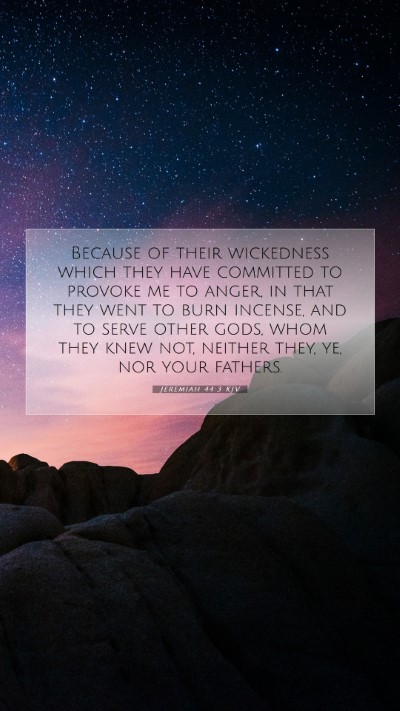Understanding Jeremiah 44:3
Jeremiah 44:3 states:
"Because of their wickedness which they have committed to provoke me to anger, in that they went to burn incense, and to serve other gods, whom they knew not, neither they, ye, nor your fathers."
Background and Context
The book of Jeremiah unfolds during a tumultuous period in Israel's history. The people are grappling with the consequences of their persistent idolatry and disobedience to God. This verse encapsulates the Lord's charge against the people of Judah for their unfaithfulness and the dire repercussions of their actions.
Meaning and Interpretations
In this verse, God expresses His profound disappointment in the Israelites for turning their backs on Him. Key commentaries offer rich insights:
- Matthew Henry: He emphasizes the seriousness of the sin of idolatry, noting that the people ‘provoked God to anger’ by worshiping deities they and their ancestors did not know. This evokes a sense of betrayal, likening their actions to a violation of a covenant.
- Albert Barnes: He elaborates on the idea of wickedness, underscoring that these deliberate acts of worship to false gods stem from a rejection of God's sovereignty. Barnes connects this disobedience to historical patterns where the Israelites consistently strayed from the commandments.
- Adam Clarke: Clarke points out that the ‘burning of incense’ represents a significant act of worship that, in this context, is a direct affront to God. He highlights the importance of understanding the historical backdrop—where the Israelites, despite witnessing God's deliverance, still chose the path of idolatry.
Key Themes
- Idolatry: The primary theme revolves around the dangers of false worship and the consequences of turning away from God. The Israelites’ choice to seek out foreign gods illustrates a broader message applicable to all believers regarding fidelity to their faith.
- Divine Anger: The notion that sin provokes God’s wrath is a critical aspect of this verse. Understanding God’s character entails recognizing that He desires loyalty and truth from His people.
- Historical Accountability: The mention of ‘your fathers’ positions the current generation within a historical continuum of disobedience, reminding readers of the inherited consequences of sin.
Applications for Today
This verse speaks profoundly to contemporary believers, urging them to evaluate their own allegiances. Key applications include:
- Self-Examination: Believers are called to reflect on their lives and pinpoint any ‘idols’—those distractions or priorities that might take precedence over their relationship with God.
- Covenant Loyalty: As God’s people, understanding the sacredness of commitment in faith is foundational. This verse calls for a rejuvenation of dedication to God and His ways.
- Community Awareness: Encouraging collective faithfulness within churches and communities can be seen as a protective measure against the surrounding influences that lead to spiritual compromise.
Related Bible Verses
Several cross-references deepen the insight drawn from Jeremiah 44:3:
- Exodus 20:3-5: The commandment against having other gods emphasizes the seriousness of idolatry.
- Isaiah 42:8: God declares His glory and stress on worshiping Him alone.
- Romans 1:25: Reflects on how people can exchange the truth of God for a lie, paralleling the actions of Judah.
Conclusion
Jeremiah 44:3 serves as a poignant reminder of the continual struggle against idolatry and the necessity of faithfulness to God. By studying Scripture and seeking biblical exegesis, one can extract essential insights that enhance one’s understanding of Scripture and facilitate deeper Bible verse explanations. Through community and personal study, believers can glean insights that shape their daily lives and choices.


